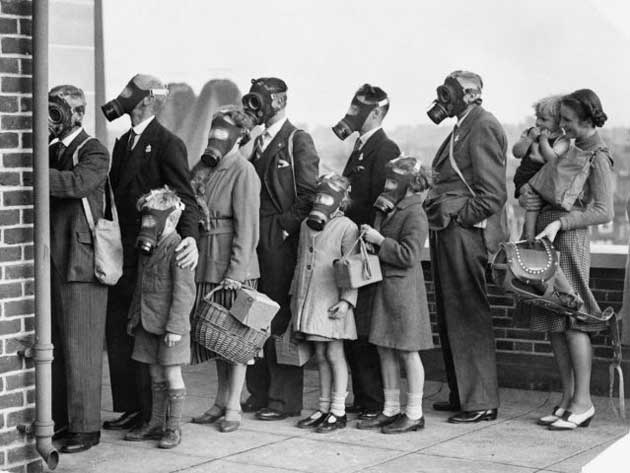Outbreak 1939, Imperial War Museum, London
Seventy years on from the outbreak of the Second World War, the Imperial War Museum remembers a country with little sense of the suffering to come

Exhibitions about the Second World War are, by and large, expected to be gruellingly dramatic affairs. Commemorating the 70th anniversary of its outbreak, however, the Imperial War Museum's new show is a rather different animal, capturing not the storm of conflict but its eerily quiet beginning.
A 1930s living room replete with replica wireless sets and reproduction newspapers sets the scene for headlines that emblazon the walls with optimistic – and misreported – news stories. "'Nazis cracking,' says Paris", reads one from the London Evening Standard. Meanwhile, cheery posters issue instructions to "Keep calm and carry on". The ration books on display look crisp and unused. These are the months of Britain's "phoney war", when the most damage the RAF inflicted on Germany was littering it with propaganda leaflets; the threat of full-blown military action as yet appeared unreal; the consequent sense of hardship and fear, and the extremes of bravery, cruelty and suffering that permeate the museum's permanent Second World War exhibition rooms are notable for their absence.
The star attraction of "Outbreak 1939" is Prime Minister Neville Chamberlain's diary from the period, on display for the first time. "War declared" is the hastily scrawled entry for 3 September. His pitiful radio announcement, which hit the airwaves at 11.15 that morning, booms with resignation from period-style headphones: "It is a sad day for us all. For none is it sadder than for me."
Chamberlain, much lambasted for his failed attempts to appease Hitler, seems to be the only figure genuinely distressed by the declaration of war in this exhibition. The rousing address of his political rival Winston Churchill to the House of Commons, in which he declaims that the conflict will "revive the stature of man", contrasts starkly with Chamberlain's letters to his sisters, recording his sleepless nights and "dreadful anxieties".
Meanwhile, it was business as usual for entrepreneurial Brits who rushed to cash in on the war. Blackout blinds and specially branded clips for holding them in place were churned out, turning one of the period's greatest public inconveniences into a lively industry. Also displayed are kitsch memorabilia teapots and satirical cartoon books, including the deliciously named Lewis Carroll spoof Adolf in Blunderland.
Personal testimonies included in "Outbreak 1939" cut across class and nationality divides. Interviews with Winston Churchill's daughter Mary and the Duke of Edinburgh's cousin Countess Mountbatten – both off riding their horses when the announcement was made – are screened alongside interviews with a Jamaican sailor and German U-boat wireless operator. Elsewhere, a German Jewish refugee tells the story of how she was interned by the Home Office, despite being signed off without restrictions by a tribunal.
Fresh though these are, it is telling just how far 70 years have brought us from the shadow of these great events: there are no fresh testimonies from any of the conflict's leading figures – the politicians and military bigwigs – who were still alive the last time the museum covered the period in 1969.
Instead, the museum's senior historian, Terry Charman, has created a bite-sized diary of those early war months, seen largely from the perspective of Joe Public. It is an engaging, although somewhat superficial, exercise. Designed to be accessible to "an intelligent 15-year-old", the captions illustrating the display are light on detail. Visitors looking for greater depth might want to invest in Charman's accompanying book.
Without this, there is no escaping the at times trivial tone of "Outbreak 1939". The colourful displays and cheery accounts jar with countless bloody tales in adjacent rooms of the Imperial War Museum. However, it is this very contrast that points up the strangeness of a world at war in name but not yet in action.
(020-7416 5320) to 5 September 2010
Join our commenting forum
Join thought-provoking conversations, follow other Independent readers and see their replies
Comments